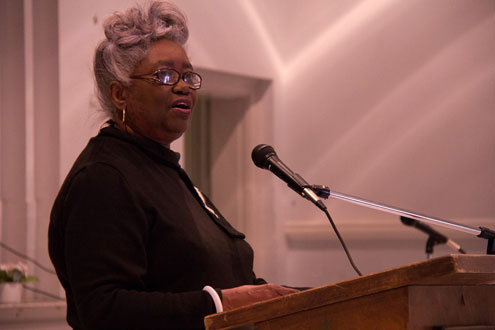“O courage, my soul, and let us journey on” were the lyrics sung by the Holt High School Choir during Saturday’s first annual Holt Black History Celebration, a ceremony meant to honor the growth and transformation of the Holt community since the time of segregation.
The ceremony was organized by Holt in Action’s Arts and Heritage Committee, a group created after the April 27 tornado to help in rebuilding the community both physically and emotionally.
“We are trying to build racial harmony as we continue to recreate Holt,” said Nancy Callahan, head of the Arts and Heritage Committee.
There were more than 15 speakers, black and white, who all told stories about their experiences in Holt during desegregation.
Joe Nathan Moore Jr. entered Holt High School in the fall of 1965 as the only black student in his sophomore class.
“I was the only fly in the buttermilk,” Moore said.
Moore said he was alone for three years.
“I already didn’t have the white folks saying anything, and now those at Boteler [his former high school] were calling me a traitor,” Moore said.
Moore had to work as a janitor at the school to earn the money to pay for his cap and gown for graduation. He also worked in the school kitchen in order to receive his meals for the day.
“I don’t regret anything we went through,” Moore said. “Those students were able to teach their kids that we [African Americans] were just like them.”
Moore said his whole class, all white students, stood up and applauded when he walked across the stage at graduation. He had not given up, and he had made a difference in his community.
“They made a change,” said Joe Boteler, who graduated in 1967 as a white member of the first class at Holt to contain black students. “These six students showed up at Holt to make a difference in this world.”
Offa Mae Brown Parker was born in Holt in 1928 and was pulled out of school at an early age to work in the cotton fields. She received little education and had to teach herself to read with the Bible. Parker has 10 children and has taught a weekly Bible class at the Crescent East Apartments for more than 40 years.
She said God has blessed her, so she has made it through.
“I hope that one day, people will not have to go through what I did…they can have a better life,” Parker said.
Salley Bell Cook grew up in the Holt community and was bused from Holt to a school in Northport prior to desegregation efforts. Upon graduating from Stillman College, Cook had to register to vote in order to get a job teaching. She was forced to pay a poll tax and take a literacy test to register to vote.
“Those things made me a stronger person,” Cook said. “When I became a teacher, I no longer saw black and white, I saw students, because that’s what I was hired to do.”
All of these men and women were an essential part of helping the Holt community grow into the integrated, more racially accepting community that it is today.
The program ended with a choral benediction where the entire audience joined in singing “We shall overcome… We’ll walk hand in hand… We shall be free,” an anthem to the hope for continued growth in the Holt Community.









